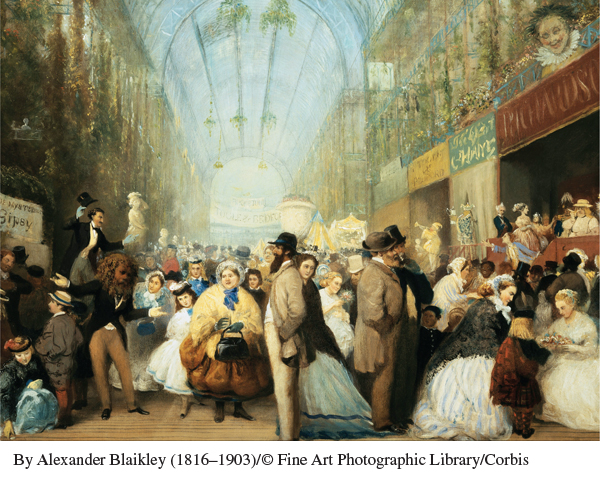A History of Western Society: Printed Page 718
A History of Western Society, Value Edition: Printed Page 688
A History of Western Society, Concise Edition: Printed Page 717
Introduction for Chapter 22
22
Life in the Emerging Urban Society
1840–1914
When Londoners gathered in 1860 at the Grand Fete in the Crystal Palace (see painting below), they enjoyed the pleasures of an established urban society that would have been unthinkable just sixty years earlier. Across the nineteenth century, as industrialization expanded exponentially, Europeans left their farms and country villages to find work in the ever-
Despite the happy faces in the London crowd pictured here, the emerging urban society brought costs as well as benefits. On the whole, living standards rose in the nineteenth century, but wages and living conditions varied greatly, and many city dwellers were still poor. Advances in public health and urban planning brought some relief to the squalid working-

CHAPTER PREVIEW
How did urban life change in the nineteenth century?
What did the emergence of urban industrial society mean for rich and poor and those in between?
How did urbanization affect family life and gender roles?
How and why did intellectual life change in this period?
Chronology
| ca. 1840s–1890s | Realism dominant in Western arts and literature |
| 1848 | Cholera epidemic and first public health law in Britain |
| ca. 1850–1870 | Modernization of Paris |
| 1850–1914 | Condition of working classes improves |
| 1854 | Pasteur begins studying fermentation and in 1863 develops pasteurization |
| 1854–1870 | Development of germ theory |
| 1859 | Darwin publishes On the Origin of Species by the Means of Natural Selection |
| 1865 | Completion of London sewer system |
| 1869 | Mendeleev creates periodic table |
| 1880–1913 | Second Industrial Revolution; birthrate steadily declines in Europe |
| 1890 | Max Weber publishes The Protestant Ethic and the Spirit of Capitalism |
| 1890s | Electric streetcars introduced in Europe |